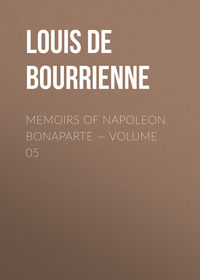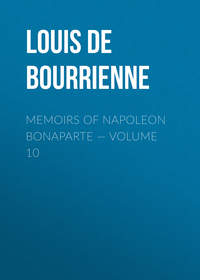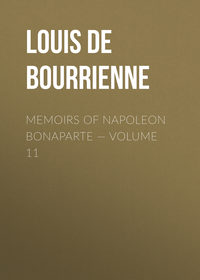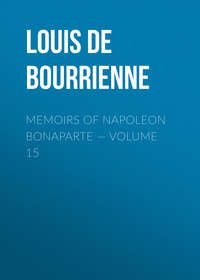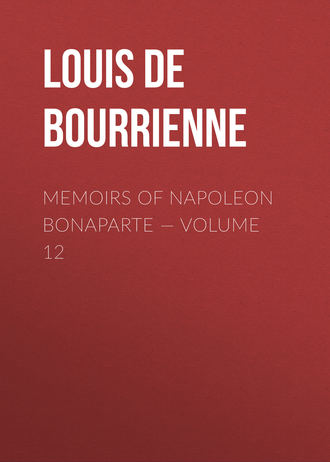 полная версия
полная версияMemoirs of Napoleon Bonaparte — Volume 12
CHAPTER XXIX
1813.
Napoleon's second visit to Dresden—Battle of Bantzen—The Congress at Prague—Napoleon ill advised—Battle of Vittoria—General Moreau Rupture of the conferences at Prague—Defection of Jomini—Battles of Dresden and Leipsic—Account of the death of Duroc—An interrupted conversation resumed a year after—Particulars respecting Poniatowski—His extraordinary courage and death— His monument at Leipsic and tomb in the cathedral of Warsaw.
On the 2d of May Napoleon won the battle of Lutzen. A week after he was at Dresden, not as on his departure for the Russian campaign, like the Sovereign of the West surrounded by his mighty vassals: he was now in the capital of the only one of the monarchs of his creation who remained faithful to the French cause, and whose good faith eventually cost him half his dominions. The Emperor stayed only ten days in Dresden, and then went in pursuit of the Russian army, which he came up with on the 19th, at Bautzen. This battle, which was followed on the two succeeding days by the battles of Wurtchen and Oclikirchen, may be said to have lasted three days—a sufficient proof that it was obstinately disputed. It ended in favour of Napoleon, but he and France paid dearly for it: while General Kirschner and Duroc were talking together the former was killed by a cannon-ball, which mortally wounded the latter in the abdomen.
The moment had now arrived for Austria to prove whether or not she. intended entirely to desert the cause of Napoleon.
—[There is a running attack in Erreurs (tome, ii. pp, 289-325) on all this part of the Memoirs, but the best account of the negotiations between France, Austria, and the Allies will be found in Metternich, Vol. i. pp. 171-215. Metternich, with good reason, prides himself on the skill with which he gained from Napoleon the exact time, twenty days, necessary for the concentration of the Austrian armies. Whether the negotiations were consistent with good faith on the part of Austria is another matter; but, one thing seems clear—the Austrian marriage ruined Napoleon. He found it impossible to believe that the monarch who had given him his daughter would strike the decisive blow against him. Without this belief there can be no doubt that he would have attacked Austria before she could have collected her forces, and Metternich seems to have dreaded the result. "It was necessary, therefore to prevent Napoleon from carrying out his usual system of leaving an army of observation before the Allied armies, and himself turning to Bohemia to deal a great blow at us, the effect of which it would be impossible to foresee in the present depressed state of the great majority of our men" (Metternich, Vol. i, p. 177). With our knowledge of how Napoleon held his own against the three armies at Dresden we may safely assume that he would have crushed Austria if she had not joined him or disarmed. The conduct of Austria was natural and politic, but it was only successful because Napoleon believed in the good faith of the Emperor Francis, his father-in- law. It is to be noted that Austria only succeeded in getting Alexander to negotiate on the implied condition that the negotiations were not to end in a peace with France. See Metternich, Vol. i. p. 181, where, in answer to the Czar's question as to what would become of their cause if Napoleon accepted the Austrian mediation, he says that if Napoleon declines Austria will join the Allies. If Napoleon accepts, "the negotiations will most certainly show Napoleon to be neither wise nor just, and then the result will be the same. In any case we shall have gained the necessary time to bring our armies into such positions that we need not again fear a separate attack on any one of them, and from which we may ourselves take the offensive."]—
All her amicable demonstrations were limited to an offer of her intervention in opening negotiations with Russia. Accordingly, on the 4th of June, an armistice was concluded at Pleiswitz, which was to last till the 8th of July, and was finally prolonged to the 10th of August.
The first overtures after the conclusion of the armistice of Pleiswitz determined the assembling of a Congress at Prague. It was reported at the time that the Allies demanded the restoration of all they had lost since 1805; that is to say, since the campaign of Ulm. In this demand Holland and the Hanse Towns, which had become French provinces, were comprehended. But we should still have retained the Rhine, Belgium, Piedmont, Nice, and Savoy. The battle of Vittoria,
—The news of this decisive battle increased the difficulty of the French plenipotentiaries at Prague, and raised the demands of the Allies. It also shook the confidence of those who remained faithful to us.—Bourrienne.]—
which placed the whole of Spain at the disposal of the English, the retreat of Suchet upon the Ebro, the fear of seeing the army of Spin annihilated, were enough to alter the opinions of those counsellors who still recommended war. Notwithstanding Napoleon's opposition and his innate disposition to acquire glory by his victories, probably he would not have been inaccessible to the reiterated representations of sensible men who loved their country, France, therefore, has to reproach his advisers. At this juncture General Moreau arrived; it has been said that he came at the solicitation of Bernadotte. This is neither true nor probable. In the first place, there never was any intimacy between Bernadotte and Moreau; and, in the next, how can it be imagined that Bernadotte wished to see Moreau Emperor! But this question is at once put at rest by the fact, that in the interview at Abo the Emperor of Russia hinted to Bernadotte the possibility of his succeeding Napoleon. It was generally reported at the time, and I have since learnt that it was true, that the French Princes of the House of Bourbon had made overtures to Moreau through the medium of General Willot, who had been proscribed on the 18th Fructidor; and I have since learned from an authentic source that General Moreau, who was then at Baltimore, refused to support the Bourbon cause. Moreau yielded only to his desire of being revenged on Napoleon; and he found death where he could not find glory.
At the end of July the proceedings of the Congress at Prague were no. further advanced than at the time of its assembling. Far from cheering the French with the prospect of a peace, the Emperor made a journey to Mayence; the Empress went there to see him, and returned to Paris immediately after the Emperor's departure. Napoleon went back to Dresden, and the armistice not being renewed, it died a natural death on the 17th of August, the day appointed for its expiration. A fatal event immediately followed the rupture of the conferences. On the 17th of August Austria, wishing to gain by war as she had before gained by alliances, declared that she would unite her forces with those of the Allies. On the very opening of this disastrous campaign General Jomini went over to the enemy. Jomini belonged to the staff of the unfortunate Marshal Ney, who was beginning to execute with his wonted ability, the orders he had received. There was much surprise at his eagerness to profit by a struggle, begun under such melancholy auspices, to seek a fresh fortune, which promised better than what he had tried under our flag. Public opinion has pronounced judgment on Jomini.
—[It was on the 11th of August, not the 17th, that Metternich announced to Caulaincourt, Napoleon's plenipotentiary at Prague, that Austria had joined the Allies and declared war with France; At midnight on 10th August Metternich had despatched the passports for the Comte Louis de Narbonne, Napoleon's Ambassador, and the war manifesto of the Emperor Francis; then he had the beacons lighted which had been prepared from Prague to the Silesian frontier, as a sign of the breech of the negotiations, and the right (i.e. power) of the Allied armies to cross the Silesian frontier (Metternich, vol. i, p. 199).]—
The first actions were the battle of Dresden, which took place seven days after the rupture of the armistice, and the battle in which Vandamme was defeated, and which rendered the victory of Dresden unavailing. I have already mentioned that Moreau was killed at Dresden. Bavaria was no sooner rid of the French troops than she raised the mask and ranged herself among our enemies.
In October the loss of the battle of Leipsic decided the fate of France. The Saxon army, which had long remained faithful to us, went over to the enemy during the battle. Prince Poniatowski perished at the battle of Leipsic in an attempt to pass the Aster.
I will here mention a fact which occurred before Duroc's departure for the campaign of 1812. I used often to visit him at the Pavilion Marsan, in the Tuileries, where he lodged. One forenoon, when I had been waiting for him a few minutes, he came from the Emperor's apartments, where he had been engaged in the usual business, He was in his court-dress. As soon as he entered he pulled off his coat and hat and laid them aside. "I have just had a conversation with the Emperor about you," said he. "Say nothing to anybody. Have patience, and you will be—" He had, no sooner uttered these words than a footman entered to inform him that the Emperor, wished to see him immediately. "Well," said Duroc, "I must go." No sooner was the servant gone than Duroc stamped violently on the floor, and exclaimed, "That ——- ——- never leaves me a moment's rest. If he finds I have five minutes to myself in the course of the morning he is sure to send for me." He then put on his coat and returned to the Emperor, saying, "Another time you shall hear what I have to tell you."
From that time I did not see Duroc until, the month of January 1813. He was constantly absent from Paris, and did not return until the end of 1812. He was much affected at the, result of the campaign, but his confidence in Napoleon's genius kept up his spirits. I turned the conversation from this subject and reminded him of his promise to tell me what had passed between the Emperor and himself relative tome. "You shall hear," said he. "The Emperor and I had been playing at billiards, and, between ourselves, he plays very badly. He is nothing at a game which depends on skill. While negligently rolling his balls about he muttered these words: 'Do you ever see Bourrienne now?'—'Yes, Sire, he sometimes dines with me on diplomatic reception-days, and he looks so droll in his old-fashioned court-dress, of Lyons manufacture, that you would laugh if you saw him.'—'What does he say respecting the new regulation for the court-dresses?'—'I confess he says it is very ridiculous; that it will have no other result than to enable the Lyons manufacturers to get rid of their old-fashioned goods; that forced innovations on the customs of a nation are never successful.'—'Oh, that is always the way with Bourrienne; he is never pleased with anything.'— 'Certainly, Sire, he is apt to grumble; but he says what he thinks.'— 'Do you know, Duroc, he served me very well at Hamburg. He raised a good deal of money for me. He is a man who understands business. I will not leave him unemployed. Time must hang heavily on his hands. I will see what I can do for him. He has many enemies.'—`And who has not, Sire?'— 'Many complaints against him were transmitted to me from Hamburg, but the letter which he wrote to me in his justification opened my eyes, and I begin to think that Savary had good motives for defending him. Endeavours are made to dissuade me from employing him, but I shall nevertheless do so at last. I remember that it was he who first informed me of the near approach of the war which we are now engaged in. I forget all that has been said against him for the last two years, and as soon as peace is concluded, and I am at leisure, I will think of him.'"
After relating to me this conversation Duroc said, "you must, of course, feel assured that I said all I think of you, and I will take an opportunity of reminding him of you. But we must we patient. Adieu, my dear friend; we must set off speedily, and Heaven knows when we shall be back again!" I wished him a successful campaign and a speedy return. Alas! I was doomed to see my excellent friend only once again.
Next to the death of Duroc the loss most sincerely regretted during the campaign of 1813 was that of Prince Poniatowski. Joseph Poniatowaki, a nephew of Stanislas Augustus, King of Poland, was born at Warsaw on the 7th of May 1763: At an early age he was remarkable for his patriotic spirit; but his uncle's influence gave him an apparent irresolution, which rendered him suspected by some of the parties in Poland. After his uncle had acceded to the Confederation of Targowitz, Poniatowski left the service accompanied by most of his principal officers. But when, in 1794, the Poles endeavoured to repulse the Russians, he again repaired to the Polish camp and entered the army as a volunteer. His noble conduct obtained for him the esteem of his countrymen. Kosciusko gave him the command of a division, with which he rendered useful services during the two sieges of Warsaw. Immediately after the surrender of that capital Poniatowski went to Vienna. He refused the offers of Catherine and Paul to bear arms in the service of Russia.
Poniatowaki retired to his estate year Warsaw, where he lived like a private gentleman until the creation of the Grand Duchy of Warsaw revived the hopes of the Polish patriots. He then became War Minister. The Archduke Ferdinand having come, in 1809, with Austrian troops to take possession of the Duchy of Warsaw, Poniatowski, who commanded the Polish troops, which were very inferior in numbers to the Austrian force, obliged the latter, rather by dint of skillful maneuvering than by fighting, to evacuate the Grand Duchy. He pursued them into Galicia as far as Cracow.
After this honourable campaign he continued to exercise his functions as Minister until 1812. The war against Russia again summoned him to the head of the Polish army. After taking part in all the events of that war, which was attended by such various chances, Poniatowaki was present at the battle of Leipsic. That battle, which commenced on the 14th of October, the anniversary of the famous battles of Ulm and of Jena, lasted four days, and decided the fate of Europe. Five hundred thousand men fought on a surface of three square leagues.
Retreat having become indispensable, Napoleon took leave at Leipsic of the King of Saxony and his family, whom he had brought with him from Dresden. The Emperor then exclaimed in a loud voice, "Adieu; Saxons," to the people who filled the market-place, where the King of Saxony resided. With some difficulty, and after passing through many turnings and windings, he gained the suburb of Runstadt and left Leipsic by the outer gate of that suburb which leads to the bridge of the Elster, and to Lindenau. The bridge was blown up shortly after he had passed it, and that event utterly prevented the retreat of the part of the army which was on the left bank of the Easter, and which fell into the power of the enemy. Napoleon was at the time accused of having ordered the destruction of the bridge immediately after he had himself passed it in order to secure his own personal retreat, as he was threatened by the active pursuit of the enemy. The English journals were unanimous on this point, and to counteract this opinion, which was very general, an article was inserted in the 'Moniteur'.
Before passing the bridge of the Elster Napoleon had directed Poniatowski, in concert with Marshal Macdonald, to cover and protect the retreat, and to defend that part of the suburb of Leipsic which is nearest to the Borne road. For the execution of these orders he had only 2000 Polish infantry. He was in this desperate situation when he saw the French columns in full retreat and the bridge so choked up with their artillery and waggons that there was no possibility of passing it. Then drawing his sword, and turning to the officers who were near him, he said, "Here we must fall with honour!" At the head of a small party of cuirassiers and Polish officers he rushed on the columns of the Allies. In this action he received a ball in his left arm: he had already been wounded on the 14th and 16th. He nevertheless advanced, but he found the suburb filled with Allied troops.
—[The Allies were so numerous that they scarcely perceived the losses they sustained. Their masses pressed down upon us in every direction, and it was impossible that victory could fail to be with them. Their success, however, would have been less decisive had it not been for the defection of the Saxons. In the midst of the battle, these troops having moved towards the enemy, as if intending to make an attack, turned suddenly around, and opened a heavy fire of artillery and musketry on the columns by the aids of which they had a few moments before been fighting. I do not know to what page of history such a transaction is recorded. This event immediately produced a great difference in our affairs, which were before in a bad enough train. I ought here mention that before the battle the Emperor dismissed a Bavarian division which still remained with him. He spoke to the officers in terms which will not soon be effaced from their memory. He told them, that, "according to the laws of war, they were his prisoners, since their Government had taken part against him; but that he could not forget the services they had rendered him, and that they were therefore at liberty to return home." These troops left the army, where they were much esteemed, and marched for Bavaria.]—
He fought his way through them and received another wound. He then threw himself into the Pleisse, which was the first river he came to. Aided by his officers, he gained the opposite bank, leaving his horse in the river. Though greatly exhausted he mounted another, and gained the Elster, by passing through M. Reichenbach's garden, which was situated on the side of that river. In spite of the steepness of the banks of the Elster at that part, the Prince plunged with his horse into the river: both man and horse were drowned, and the same fate was shared by several officers who followed Poniatawski's example. Marshal Macdonald was, luckily, one of those who escaped. Five days after a fisherman drew the body of the Prince, out of the water. On the 26th of October it was temporarily interred at Leipsic, with all the honours due to the illustrious deceased. A modest stone marks the spot where the body of the Prince was dragged from the river. The Poles expressed a wish to. erect a monument to the memory of their countryman in the garden of M. Reichenbach, but that gentleman declared he would do it at his own expense, which he did. The monument consists of a beautiful sarcophagus, surrounded by weeping willows. The body of the Prince, after bring embalmed, was sent in the following year to Warsaw, and in 1816 it was deposited in the cathedral, among the remains of the Kings and great men of Poland. The celebrated Thorwaldsen was commissioned to execute a monument for his tomb. Prince Poniatowski left no issue but a natural son, born in 1790. The royal race, therefore existed only in a collateral branch of King Stanislas, namely, Prince Stanislas, born in 1754.
CHAPTER XXX
1813
Amount of the Allied forces against Napoleon—Their advance towards the Rhine—Levy of 280,000 men—Dreadful situation of the French at Mayence—Declaration of the Allies at Frankfort—Diplomatic correspondents—The Due de Bassano succeeded by the Duke of Vicenza —The conditions of the Allies vaguely accepted—Caulaincourt sent to the headquarters of the Allies—Manifesto of the Allied powers to the French people.—Gift of 30,000,000 from the Emperor's privy purse—Wish to recall M. de Talleyrand—Singular advice relative to Wellington—The French army recalled from Spain—The throne resigned Joseph—Absurd accusation against M. Laine—Adjournment of the Legislative Body—Napoleon's Speech to the Legislative Body—Remarks of Napoleon reported by Cambaceres.
When the war resumed its course after the disaster of Leipsic I am certain that the Allied sovereigns determined to treat with Napoleon only in his own capital, as he, four years before, had refused to treat with the Emperor of Austria except at Vienna. The latter sovereign now completely raised the mask, and declared to the Emperor that he would make common cause with Russia and Prussia against him. In his declaration he made rise of the singular pretext, that the more enemies there were against Napoleon there would be the greater chance of speedily obliging him to accede to conditions which would at length restore the tranquillity of which Europe stood so much in need. This declaration on the part of Austria was an affair of no little importance, for she had now raised an army of 260,000 men. An equal force was enrolled beneath the Russian banners, which were advancing towards the Rhine. Prussia had 200,000 men; the Confederation of the Rhine 150,000: in short, including the Swedes and the Dutch, the English troops in Spain and in the Netherlands, the Danes, who had abandoned us, the Spaniards and Portuguese, whose courage and hopes were revived by our reverses, Napoleon had arrayed against him upwards of a million of armed men. Among them, too, were the Neapolitans, with Murat at their head!
The month of November 1813 was fatal to the fortune of Napoleon. In all parts the French armies were repulsed and driven back upon the Rhine, while-in every direction, the Allied forces advanced towards that river. For a considerable time I had confidently anticipated the fall of the Empire; not because the foreign sovereigns had vowed its destruction, but because I saw the impossibility of Napoleon defending himself against all Europe, and because I knew that, however desperate might be his fortune, nothing would induce him to consent to conditions which he considered disgraceful. At this time every day was marked by a new defection. Even the Bavarians, the natural Allies of France, they whom the Emperor had led to victory at the commencement of the second campaign of Vienna, they whom he had, as it were, adopted on the field of battle, were now against us, and were the bitterest of our enemies.
Even before the battle of Leipsic, the consequences of which were so ruinous to Napoleon, he had felt the necessity of applying to France for a supply of troops; as if France had been inexhaustible. He directed the Empress Regent to make this demand; and accordingly Maria Louisa proceeded to the Senate, for the first time, in great state: but the glories of the Empire were now on the decline. The Empress obtained a levy of 280,000 troops, but they were no sooner enrolled than they were sacrificed. The defection of the Bavarians considerably augmented the difficulties which assailed the wreck of the army that had escaped from Leipsic. The Bavarians had got before us to Hanau, a town four leagues distant from Frankfort; there they established themselves, with the view of cutting off our retreat; but French valour was roused, the little town was speedily carried, and the Bavarians were repulsed with considerable loss. The French army arrived at Mayence; if, indeed, one may give the name of army to a few masses of men destitute, dispirited, and exhausted by fatigue and privation. On the arrival of the troops at Mayence no preparation had been made for receiving them: there were no provisions, or supplies of any kind; and, as the climax of misfortune, infectious epidemics broke out amongst the men. All the accounts I received concurred in assuring me that their situation vas dreadful:
However; without counting the wreck which escaped from the disasters of Leipsic, and the ravages of disease; without including the 280,000 men which had been raised by a 'Senatus-consulte, on the application of Maria Louisa, the Emperor still possessed 120,000 good troops; but they were in the rear, scattered along the Elbe, shut up in fortresses such as Dantzic, Hamburg, Torgau, and Spandau. Such was the horror of our situation that if, on the one hand, we could not resolve to abandon them, it was at the same time impossible to aid them. In France a universal cry was raised for peace, at whatever price it could be purchased. In this state of things it may be said that the year 1813 was more fatal to Napoleon than the year 1812. The disasters of Moscow were repaired by his activity and the sacrifices of France; but the disasters of Leipsic were irreparable.



